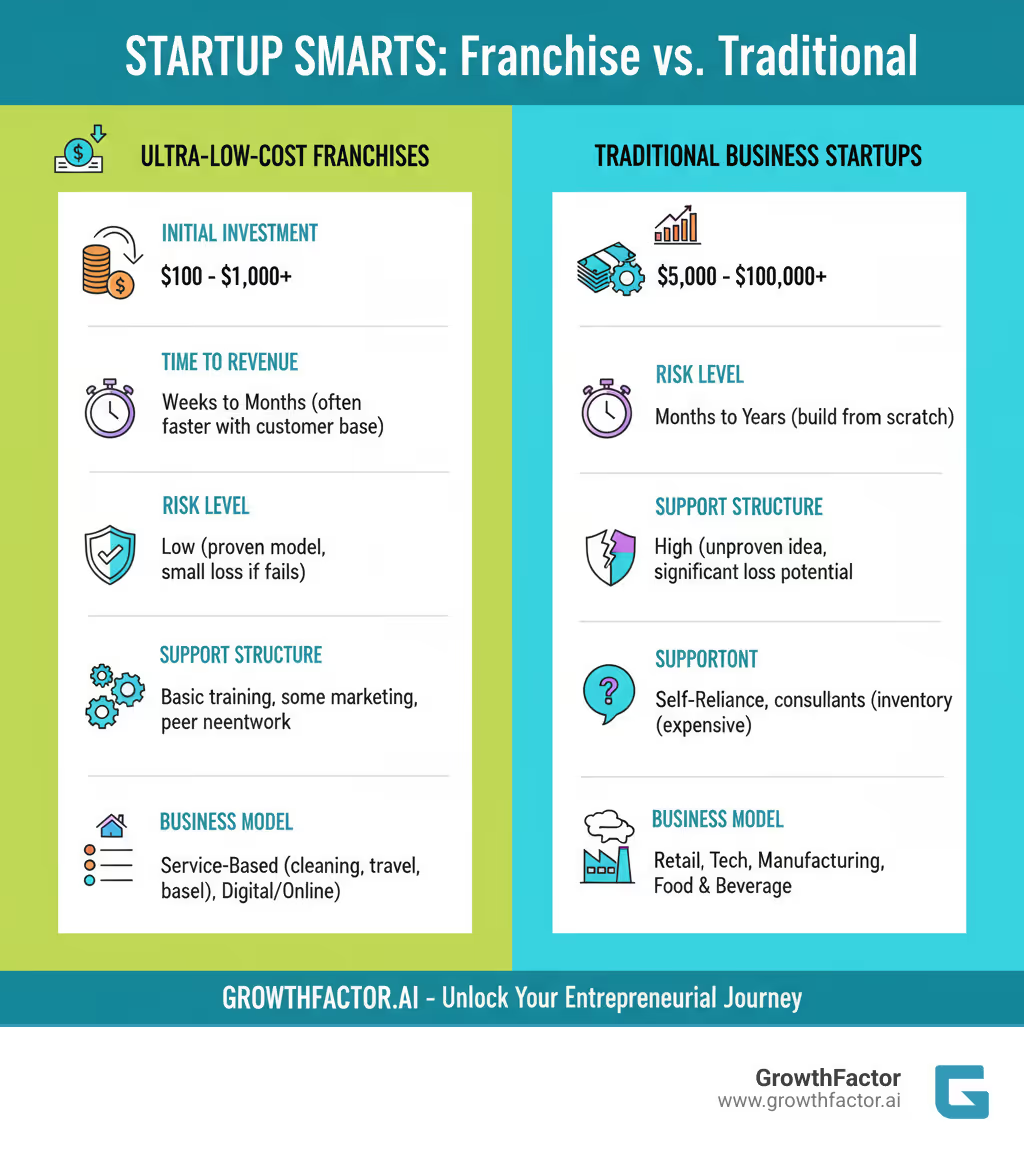Dream Big, Spend Little: Cheap Franchises That Won't Break the Bank
Written by: Clyde Christian Anderson
The Surprising Reality of Ultra-Low-Cost Franchise Opportunities

Cheap franchises under $1000 are real, accessible opportunities for aspiring entrepreneurs to enter business ownership without massive upfront capital. While franchising often brings to mind high-cost ventures like McDonald's, a growing segment of ultra-low-cost options is changing the narrative.
Here are some viable examples:
FranchiseInitial InvestmentBusiness ModelKey FeaturesDream Vacations$495Home-based travel agencyCommission-based, no inventory requiredBuildingstars$795Commercial cleaningGuaranteed customer base, part-time optionJAN-PRO$1,000-$5,000Home-based cleaningEquipment and initial accounts includedThese are legitimate businesses built on lean models: service-based operations with minimal overhead, home-based structures that eliminate real estate costs, and commission-driven sales. For under $1,000, you typically get a franchise fee, initial training, and basic marketing materials. The catch is that you're building a brand with less name recognition and receiving less hands-on support than you would with a six-figure investment. The fee doesn't cover ongoing operational costs, insurance, or the sweat equity needed to grow.
The appeal is clear: lower financial risk, accessibility, and the flexibility to start part-time. However, a low barrier to entry means more competition, and some "opportunities" are little more than business-in-a-box schemes. The most critical step before investing is to review the Franchise Disclosure Document (FDD) with a franchise attorney to understand the franchisor's history, fees, and performance.
I'm Clyde Christian Anderson, founder of GrowthFactor.ai. My career in retail, from warehouse work to real estate analysis, has shown me that smart, data-driven decisions are key. Thorough due diligence separates successful ventures from costly mistakes.

The Ultra-Low-Cost Entry: Top Franchises Under $1000
Many aspiring entrepreneurs believe franchising is out of reach financially, but a category of cheap franchises under $1000 makes business ownership accessible. These legitimate opportunities are built on lean, service-focused models that minimize costs by operating from home and eliminating inventory.

Let's look at two standout examples that show what's possible for less than a thousand dollars.
Dream Vacations: Your Ticket to the Travel Industry
For $495, you can become a franchise owner with Dream Vacations and run your own home-based travel agency. This is a commission-based model where you earn money by booking travel for clients, eliminating the need for inventory or shipping. The initial fee covers your franchise license, access to booking systems, comprehensive training, and marketing materials. It's an ideal part-time start for anyone passionate about travel, offering a low-risk way to build a client base and scale up over time.
Buildingstars: A Clean Start in Commercial Services
At $795, Buildingstars offers a unique advantage: a guaranteed customer base from day one. Commercial cleaning is a high-demand industry, and Buildingstars connects you with initial accounts to start generating revenue immediately. The model is designed for part-time work on nights and weekends, with the potential to grow into a full-time business. Monthly revenue can range from $1,000 to $5,000, depending on your accounts. The fee covers training, customer service guidance, and those crucial first clients. With minimal overhead, it's a straightforward and proven business model.
Both Dream Vacations and Buildingstars show that cheap franchises under $1000 are about smart business design that prioritizes service, minimizes overhead, and provides flexibility.
Understanding the Business Models of Cheap Franchises Under $1000
The affordability of cheap franchises under $1000 comes from their efficient, low-overhead business models. Unlike traditional brick-and-mortar operations, they don't require expensive leases, extensive inventory, or large teams.

Why Service-Based and Home-Based Models Dominate
Most ultra-low-cost franchises are service-based and home-based, a strategic design that dramatically reduces startup costs. The key advantages include:
- No Real Estate Costs: Operating from home eliminates commercial rent, utilities, and maintenance, freeing up capital.
- Minimal Equipment: Service businesses like cleaning or consulting often require only basic tools or a computer and phone, avoiding the high cost of specialized machinery.
- Low Overhead: Ongoing expenses for storefronts, extensive insurance, and initial employees are avoided, allowing more revenue to become profit.
- Flexibility and Freedom: These models offer control over working hours and location, making it possible to start part-time.
For those planning future growth, understanding how to select a prime location is the next step. Our resources on retail store location can help when you're ready to expand.
The Rise of Commission-Only and Digital Opportunities
The digital age has created new franchise models that are inherently low-cost. Businesses like Dream Vacations leverage technology, allowing franchisees to run a national business from a laptop.
These digital and commission-based models thrive because there is no inventory to manage. Selling services or facilitating transactions eliminates the capital investment and logistics of physical products. This structure is also highly scalable; once systems are in place, you can increase output without a proportional rise in costs. Understanding the right market entry strategy is key to leveraging these digital advantages for long-term growth.
The Reality Check: Pros, Cons, and Potential Pitfalls
While cheap franchises under $1000 are exciting, it's crucial to approach them with a balanced mindset. Understanding the advantages and challenges is key to making a successful investment.
Pros of Cheap Franchises (<$1000)Cons of Cheap Franchises (<$1000)Low Financial RiskLimited Franchisor SupportAccessible Entry to EntrepreneurshipWeaker Brand RecognitionOpportunity to Test Management SkillsHigher CompetitionProven Systems (in some cases)Potential for Hidden Costs/ScamsFlexibility (often home-based)Lower Revenue Potential (initially)Quick Time to MarketRequires Significant Personal EffortThe Upside: Why a Low-Cost Franchise Can Be a Smart Move
The most significant advantage is low financial risk. Investing under $1,000 makes entrepreneurship accessible to almost anyone, regardless of their financial background. It's a chance to become a business owner without draining savings. Furthermore, these franchises provide a valuable learning experience in customer service, marketing, and financial discipline. You're not starting from scratch; you're leveraging a proven framework, which is a major advantage over building a business independently.
The Downside: What to Watch Out For
With a sub-$1000 investment, you won't get white-glove service. Franchisor support is often limited and more hands-off, suiting self-starters best. Brand recognition is typically weaker than with household names, meaning you'll have to work harder to build trust with customers. The low barrier to entry also creates higher competition. Finally, this space can attract illegitimate operators, making thorough vetting non-negotiable.
Uncovering Hidden Costs and Ongoing Fees
The initial investment is just the start. The Franchise Disclosure Document (FDD) is your financial roadmap, and you should review it with a franchise attorney. This document details all costs, including:
- Royalty Fees: Ongoing payments based on your revenue or a flat monthly amount.
- Advertising Fees: Contributions to system-wide marketing.
- Other Costs: Insurance, required software subscriptions, and potential renewal fees.
Don't forget working capital for supplies, equipment, and personal expenses before you turn a profit. For example, a JAN-PRO franchise may start at $1,000, but the total investment can reach $5,000 with equipment and other startup needs. Always plan for the full financial commitment, not just the entry fee. The SBA franchise directory can be a useful resource for exploring financing options for approved franchises.
Your Due Diligence Checklist: How to Invest Wisely
Even with cheap franchises under $1000, you are investing your time, energy, and money. Skipping due diligence is not an option. This process is your insurance policy against a bad investment and your roadmap to success.

Step 1: Thoroughly Research the Franchisor
Look past the low price tag and investigate the company. Check the company's history, the leadership team's industry experience, and online reviews from current and former franchisees on independent platforms. A site like Franchises Under 10k is a starting point, not the end of your research. Finally, investigate any lawsuit history, which can be found in the FDD and public records. A pattern of lawsuits from franchisees is a major red flag.
Step 2: Analyze the Franchise Disclosure Document (FDD)
The FDD is the most important document in your research. This legal disclosure contains 23 items detailing the franchisor's financial and operational history. Consult a franchise attorney to review it; their expertise is invaluable for spotting hidden risks, even for a low-cost franchise.
Pay close attention to these key items:
- Item 3 (Litigation): Reveals lawsuits involving the franchisor. Are they from franchisees claiming they were misled?
- Item 6 (Other Fees): Details ongoing costs like royalties, advertising, and technology fees that affect your profitability.
- Item 7 (Estimated Initial Investment): Outlines the total startup cost beyond the franchise fee, including working capital and supplies.
- Item 19 (Financial Performance Representations): This optional section may show earnings claims for existing franchisees. If provided, scrutinize the data. If not, you'll need to do more research to estimate potential income.
- Item 20 (Franchisees): Provides contact information for current and former franchisees—your key to real-world insights.
Understanding your market is also critical. At GrowthFactor, our approach to site selection analysis helps businesses use data to identify target markets, a crucial step even for a home-based operation.
Step 3: Connect with Current and Former Franchisees
Use the contact list from FDD Item 20 to speak with people who are living the business. Don't just talk to the happy franchisees the franchisor recommends; reach out to a random sample, including former owners.
Ask them direct questions:
- Profitability: How long did it take to break even? Are they meeting their financial goals?
- Franchisor Support: Is the training and ongoing support effective and responsive?
- Time Commitment: Is the business truly flexible, or does it demand more time than advertised?
- Overall Satisfaction: What challenges did they not anticipate? Would they make the same investment again?
Their candid insights are invaluable. This due diligence process takes effort, but it's the difference between a smart investment and a costly mistake.
Frequently Asked Questions about Cheap Franchises
Here are straightforward answers to the most common questions about cheap franchises under $1000.
What kind of revenue can I realistically expect?
Revenue varies significantly and these are not get-rich-quick schemes. Your earnings depend on your effort, time commitment, and the specific business model. For example, a Buildingstars cleaning franchise reports potential monthly gross revenues of $1,000–$5,000, while a commission-based travel agency's income scales with sales. Success also hinges on market demand and your sales skills. Always check Item 19 of the FDD for any financial performance data and talk to existing franchisees to set realistic income expectations.
What are the typical requirements for these cheap franchises under $1000?
The barrier to entry is low. Most franchisors in this category do not require a minimum net worth or liquid assets. A decent credit history can be helpful but isn't always mandatory. More importantly, franchisors look for a coachable attitude and a strong commitment to following the system. Basic business acumen in sales and customer service is a plus, but the primary requirement is the motivation to learn and work the model.
How do these compare to franchises under $5,000?
Moving into the $1,000-$5,000 range often provides a broader pool of options, potentially with more established brands and a longer track record. You may also receive a higher level of initial training and a more comprehensive starter package. For example, a JAN-PRO cleaning franchise in this tier may include initial equipment and accounts. Similarly, while Chester's Chicken has a low franchise fee of $3,500, the total investment can be much higher depending on the format, highlighting the need to distinguish between the franchise fee and total startup costs. The core principles of due diligence remain the same regardless of price.
Conclusion
Starting a business doesn't have to mean taking on massive debt. Cheap franchises under $1000 offer a genuine, accessible path to entrepreneurship, allowing you to become a business owner without high financial risk. Opportunities like Dream Vacations and Buildingstars are built on lean, service-based models that trade brand recognition for affordability and flexibility.
However, a low entry cost does not mean you should skip the homework. Rigorous due diligence is critical. Review the Franchise Disclosure Document with an attorney, talk to current and former franchisees, and understand all ongoing fees and the effort required. Starting small is a powerful way to build skills and business acumen with minimal risk.
As your business grows, data-driven decisions become essential for expansion. That's where GrowthFactor comes in. Our AI-powered platform helps businesses identify the perfect locations for growth, turning gut feelings into strategic decisions backed by real market intelligence. Whether you're evaluating your first territory or planning a multi-unit expansion, having the right data makes all the difference.
Your entrepreneurial journey starts with a single step. A low-cost franchise could be that step—just be sure to take it wisely.
Learn more about solutions for franchise development
Citations
The human algorithm
Request Your demo
Schedule meeting
Or submit your information below and we'll be in touch to schedule.


